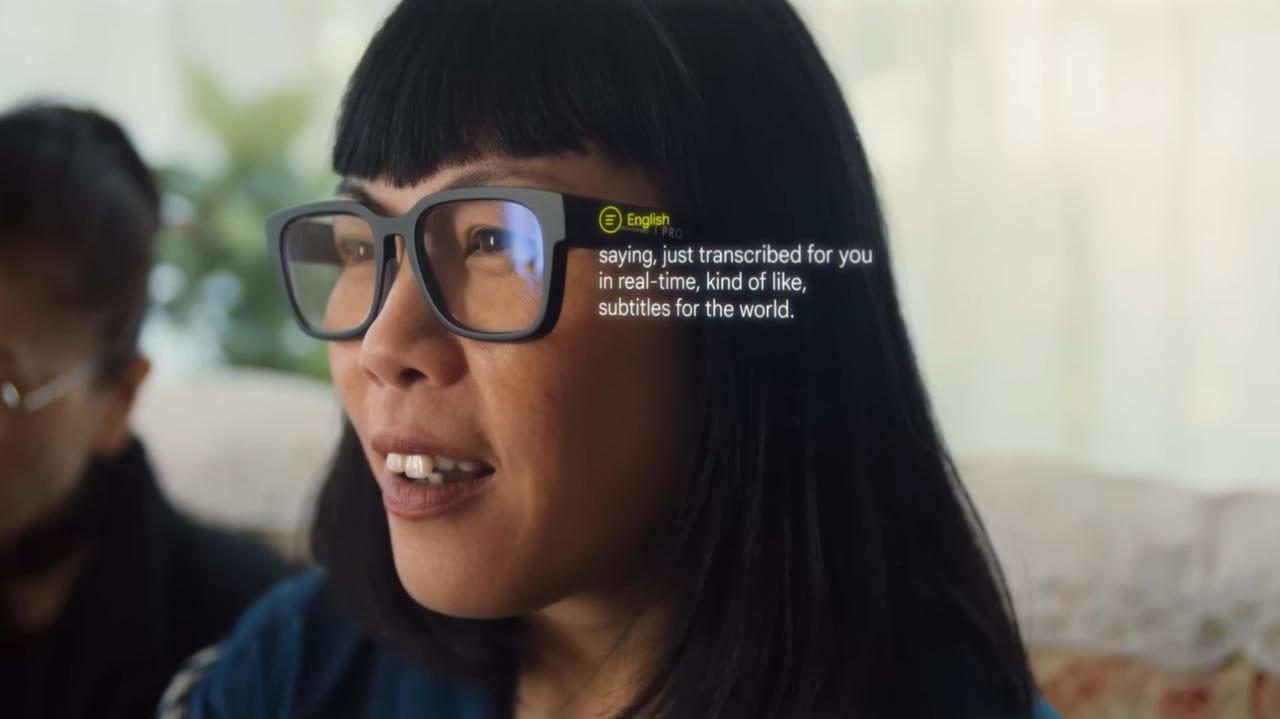Friday, May 12, 2023
Google's 'translation glasses' were actually at I/O 2023, and right in front of our eyes - ZDNet - Translation

Exactly one year ago, Google unveiled a pair of augmented reality (AR) glasses at its I/O developer conference. But unlike Google Glass, this new concept, which didn't have a name at the time (and still doesn't), demonstrated the practicality of digital overlays, promoting the idea of real-time language translation as you were conversing with another person.
It wasn't about shooting magic spells or seeing dancing cartoons but rather providing accessibility to something we all do every day: communicating.
Also: How to join the Google Search Labs waitlist to access its new AI search engine
The concept had the appearance of a regular pair of glasses, making it clear that you didn't have to look like a cyborg in order to reap the benefits of today's technology. But, again, it was just a concept, and Google hasn't really talked about the product since then.
Twelve months have passed and the popularity of AR has now been replaced by another acronym: AI, shifting most of Google and the tech industry's focus more toward artificial intelligence and machine learning and further away from metaverses and, I guess, glasses that help you transcribe language in real time. Google literally said the word "AI" 143 times during yesterday's I/O event, as counted by CNET.
But it was also during the event that something else caught my eye. No, it wasn't Sundar Pichai's declaration that hotdogs are actually tacos but, instead, a feature that Google briefly demoed with the new Pixel Fold. (The taco of smartphones? Nevermind.)
The company calls it Dual Screen Interpreter Mode, a transcription feature that leverages the front and back screens of the foldable and the Tensor G2's processing power to simultaneously display what's being spoken by one person and how it translates in another language. At a glance, you're able to understand what someone else is saying, even if they don't speak the same language as you. Sound familiar?
I'm not saying a foldable phone is a direct replacement for AR glasses; I still believe there's a future where the latter exists and potentially replaces all the devices we carry around. But the Dual Screen Interpreter Mode on the Pixel Fold is the closest callback we've gotten to Google's year-old concept, and I'm excited to test the feature when it arrives.
Also: All the hardware Google announced at I/O 2023 (and yes, there's a foldable)
The Pixel Fold is available for pre-order right now, and Google says it will start shipping by next month. But even then, you'll have to wait until the fall before the translation feature sees an official release, so stay tuned.
Google's 'translation glasses' were actually at I/O 2023, and right in front of our eyes - ZDNet - Translation

Exactly one year ago, Google unveiled a pair of augmented reality (AR) glasses at its I/O developer conference. But unlike Google Glass, this new concept, which didn't have a name at the time (and still doesn't), demonstrated the practicality of digital overlays, promoting the idea of real-time language translation as you were conversing with another person.
It wasn't about shooting magic spells or seeing dancing cartoons but rather providing accessibility to something we all do every day: communicating.
Also: How to join the Google Search Labs waitlist to access its new AI search engine
The concept had the appearance of a regular pair of glasses, making it clear that you didn't have to look like a cyborg in order to reap the benefits of today's technology. But, again, it was just a concept, and Google hasn't really talked about the product since then.
Twelve months have passed and the popularity of AR has now been replaced by another acronym: AI, shifting most of Google and the tech industry's focus more toward artificial intelligence and machine learning and further away from metaverses and, I guess, glasses that help you transcribe language in real time. Google literally said the word "AI" 143 times during yesterday's I/O event, as counted by CNET.
But it was also during the event that something else caught my eye. No, it wasn't Sundar Pichai's declaration that hotdogs are actually tacos but, instead, a feature that Google briefly demoed with the new Pixel Fold. (The taco of smartphones? Nevermind.)
The company calls it Dual Screen Interpreter Mode, a transcription feature that leverages the front and back screens of the foldable and the Tensor G2's processing power to simultaneously display what's being spoken by one person and how it translates in another language. At a glance, you're able to understand what someone else is saying, even if they don't speak the same language as you. Sound familiar?
I'm not saying a foldable phone is a direct replacement for AR glasses; I still believe there's a future where the latter exists and potentially replaces all the devices we carry around. But the Dual Screen Interpreter Mode on the Pixel Fold is the closest callback we've gotten to Google's year-old concept, and I'm excited to test the feature when it arrives.
Also: All the hardware Google announced at I/O 2023 (and yes, there's a foldable)
The Pixel Fold is available for pre-order right now, and Google says it will start shipping by next month. But even then, you'll have to wait until the fall before the translation feature sees an official release, so stay tuned.
Struggling to find the word to describe Trump this week? The historical dictionary can help - inews - Dictionary
Opinion
i columnist
In 1888 ‘trumpery’ was already well understood as a byword for something that may be extremely showy, but is also pretty worthless
May 12, 2023 12:15 pm(Updated 12:58 pm)

In a glossary of words local to the West Country, “trumpery” is defined as “rubbish of any kind; weeds or any undesirable growth”. Lest we assume the word takes its inspiration from a certain US ex-President, who this week was found liable for sexual assault and defamation, the glossary was compiled in 1888, when “trumpery” was already well understood as a byword for something that may be extremely showy, but is also pretty worthless. It is a useful description perhaps for the state of a man who faces yet more legal troubles down the road but who continues to strut the political stage to the sound of ecstatic applause from supporters who are doubling down rather than backing away.
If the current turbulence – even in already choppy waters – teaches us anything, it’s that Donald Trump’s base is resolutely immovable. Those who love Trump, love Trump, and nothing that their figurehead says or does is going to change that. While many of us struggle to fathom such arguably blind and bottomless loyalty, a historical dictionary will tell us that it is far from new, and that there is consequently a richness of words to describe it.
Sequacity is a good place to start. In the 17th century, this described readiness to follow someone no matter what, without any independence of thought or judgement. Founded upon the Latin sequi, to follow, it is a sibling of “obsequious”, which immediately introduces the notion that many followers of a cause or individual are simply fawning flatterers, who may eventually look the other way should it suit them.
In the same mould is the 17th-century “catchfart”, a mocking nickname for a servant who hung so closely to the coat-tail of their master or mistress that they were in the firing line for a lot more than they bargained for. The list goes on: the Oxford English Dictionary gives us many other labels including “croucher”, “creeper”, “spaniel”, “poodle”, and the rather wonderful “snivelard”.
A “toadeater” was another obsessive. This epithet was given originally to a quack’s assistant in the 17th and 18th centuries, who would be made to eat a poisonous toad in front of an eager crowd and then be magically “cured” by his master’s miraculous potions. The toadeater came to be seen as one who would do anything to please their master, and so to be “toadying” up to him without a second thought.
But what about those who passionately believe in an agenda or cause, without being a fickle windsock about it? Acolytes often take the name of those they follow: Thatcherites, Blairites, Cameroons and Borisites are more recent examples, while some from the past include Hughligans (a faction of the Conservative party in Churchill’s time who followed Lord Hugh Cecil) and the J’aime Berlins, the French nickname for Neville Chamberlain and a dig towards his policy of appeasement towards Germany.
Other names wear their past more lightly. Few of us would connect “dunce” with a 13th-century Scottish theologian, but its story began with the followers of John Duns Scotus, a profoundly influential figure in his time, who were known as Dunsmen. The reputation of Duns Scotus suffered during the English Reformation, and his doctrines became seen as outmoded and pedantic. In the mouths of reformers the term “duns”, and later “dunce”, became a term of abuse for someone impervious to new ideas and therefore slow to learn.
A less familiar, but highly useful, term for a short-sighted follower is that of an “ipsedixitist”. Today, it describes someone who takes the word of a single person or authority as gospel, without requiring any evidence to back it up.
Social media is therefore full of ipsedixitists, who take their name from the Latin ipsedixit, “he said so himself”. The “he” in question was the ancient Greek philosopher Pythagoras, whose disciples believed that whatever the great man said to be true must be accepted as such without question. Today’s ipsedixitism can involve anything from the “absolute fact” you heard down the pub to the “alternative fact” espoused by Donald Trump’s press team.
To throw one more word into the mix, a “bayard” is pithily defined in the OED as “one blind to the light of knowledge, who has the self-confidence of ignorance”. Such ignorance can be seductive – “I don’t wish to be without my brains”, wrote Ada Lovelace, the 19th-century mathematician and first computer programmer, “tho’ they doubtless interfere with a blind faith which would be very comfortable”. The Republican Tommy Tuberville clearly finds it quite comfy – after this week’s guilty verdict, the GOP Senator seconded Trump’s own judgement that it was yet another consequence of “THE GREATEST WITCH HUNT OF ALL TIME”, and added “It makes me want to vote for him twice”.
Trump himself has of course enjoyed a few terms himself for the various tribes within his party. RINO, “Republican in Name Only”, is used by his team for anyone who dares to cross him. Perhaps he also had a hand in naming his Trumpkins, Trumpists, and Trumpniks. For them, there is of course no point in mentioning that “trumpery” has a second meaning in the dictionary, namely “deceit; fraud; trickery”. Perhaps they might even harness the word themselves when questioning the results of the 2020 election. That’s the thing about language – it comes and goes like a gloriously inconstant companion. In the end, most of us will always be philodoxes – lovers of our own opinions. If we look at it like that, we are our own worst catchfarts.
Susie Dent is a lexicographer and etymologist. She has appeared in Dictionary Corner on Countdown since 1992, and co-hosts with Gyles Brandreth the podcast Something Rhymes with Purple.
Lost in translation: Ye Olde Orchard sign targeted by language watchdog - Global News - Translation
For 27 years, a scripted sign made to look like a parchment with the words “Ye Olde Orchard” has been inviting people into a pub in Notre-Dame-de-Grâce (NDG).

It’s known as the spot to grab a Guinness or two, just like in Ireland.
But after a complaint was filed with the French language watchdog, the Office québécois de la langue française (OQLF) has told the pub its sign is no longer good enough.
It needs to add a French descriptor next to the words.
“And then the agent on my file gave me a heads-up that as of 2025, that would change,” said Joseph Pilotte, co-owner of Orchard Group.
Pilotte says he was told by an OQLF agent that new legislation coming into force in 2025 will make their current name illegal and they’ll be forced to translate it to French.
“Which then set off obviously some alarms of like, ‘Well, we don’t want to change our sign now, to then have to do it again in two years,'” Pilotte explained.
Since then, Pilotte says he’s been going back and forth with the OQLF trying to find a solution.
He’s also addressed other complaints such as the one about a Guinness sign, reading “Lovely day for a Guinness,” being only in English.
Customers Global News spoke to don’t think having English in the pub’s posters or its name matters.
“What I want is to drink a Guinness. That’s all, OK?” Robert Nadeau said with a smile.
Michel Dufour, a francophone, shrugged the issue off.
“As long as we’re served in French, there is no problem,” he said.
The OQLF told Global News in a statement that it has never asked the pub to change its name to Le Vieux Verger instead of Ye Olde Orchard, but instead that the pub needs to add a French descriptor to its sign such a restaurant or brasserie — it’s up to the business to decide.
Trending Now
-
![]()
Jacklyn Zeman, longtime ‘General Hospital’ actor, dies at 70
-
![]()
Grocery rebate rollout: Here’s who will get the one-time payment and when
But they admit upcoming and more stringent regulations might change the size of that descriptor.
More on Canada
“In no case, including as of June 1st 2025, the Office demands that businesses translate their name or brand to French,” OQLF spokesperson Chantal Bouchard wrote in a statement. “Nevertheless, beginning June 1st, 2025, French will have to appear in a notably more prominent way when a brand is displayed on a public sign that can be seen from the outside of a store. Regulations will define the notion of ‘notable prominence’ within this context.”
Meanwhile, Pilotte insists that he’s received conflicting information.
“I’ve always been told the same thing from my agent, that she doesn’t believe our name would work in 2025,” Pilotte said.
Pilotte says all he wants is clarity and to be able to keep the pub’s Celtic identity and its name, which was inspired by the street it lives on, Old Orchard Street in NDG.

Feds’ new language strategy sparking controversy in Quebec
© 2023 Global News, a division of Corus Entertainment Inc.
Thursday, May 11, 2023
68-year-old woman from Andhra Pradesh separated from family in Kedarnath, reunites using Google Translate - India Today - Translation

By Ankita Chakravarti: When the 68-year-old woman, whose name has not been disclosed in the reports, set out on a pilgrimage to Kedarnath, she was excited to spend time with her family and experience the beauty of the holy site. However, things took a dramatic turn when she got separated from her loved ones in the crowded area. Unable to speak the language and feeling lost and alone, she turned to technology for help. With the aid of Google Translate, she was eventually able to communicate with strangers who helped her reconnect with her family.
advertisement
The woman hailed from Andhra Pradesh and was well-versed with Telugu but could not communicate in either Hindi or English. As per a PTI report, the woman separated from her family while returning from Kedarnath due to bad weather. The police who found her told the news agency that the woman was in a flustered state of mind in Gaurikund shuttle parking lot. The woman was not able to communicate with the police officials in either Hindi or English
"When we tried to speak to her, we realised she could not communicate either in Hindi or English. She was speaking only Telugu," Sub Inspector Ramesh Chandra Belwal told PTI. "Through gestures, we assured her that she would be reunited with her family. We offered her some refreshment and took the help of Google Translate to interpret whatever she was trying to tell us," he added.
The police then dialed the number the woman narrated in Telugu and it was discovered that her family was in Sonprayag, which is almost 8 kilometers away from Gaurikund, the place where the elderly woman was left alone. Through Google Translate, the police were able to communicate with the woman’s family, who were frantically searching for the 68-year-old woman.
Soon after the whereabouts of the woman’s family were known, the police arranged a vehicle and the woman was escorted to Sonprayag to be reunited with her family, the officer told the news agency.
How to use Google Translate to communicate
Notably, Google Translate can translate text between over 100 languages. You can type or write text into the Google Translate website or app. Google Translate will then translate the text into the language of your choice. Or if you want to communicate something to someone who does not understand your language. You can speak a phrase into the Google Translate microphone. Google Translate will then translate the phrase into the language of your choice. The Google Translate app is available for both Android and iOS devices. The app allows you to translate text, speak a phrase, take a picture of text, and even translate conversations in real time
--- ENDS ---
The word ‘vélorution’ is now in the Larousse dictionary - Canadian Cycling Magazine - Dictionary

On Wednesday, Vélorution Montréal shared the news that the word “vélorution” in the latest edition of the Larousse dictionary. According to the collective, vélorution is an international movement that supports and encourages cycling as a form of transportation, all while countering the predominance of car culture.
The Vélorution Montréal statement added that having the word in dictionary is important for two reasons. “It is not only the importance of the struggle led by millions of cyclists from the four corners of the globe, but also of their cycling victories that are multiplying at lightning speed,” it read.
Wout van Aert absolutely loved training in Montreal
“We are over the moon that Larousse has added ‘vélorution’ to their dictionary,” Mathieu Murphy-Perron, founding member of Vélorution Montréal said. “It is an important recognition to those who have struggled for decades to make our cities safer and more bike-friendly. It is becoming growingly evident that the ‘vélorution’ is in full swing and that it will not stop until road-use is more equitable between users so that more people will feel comfortable getting around on bike or on foot. Even here in Montreal, we have much work to do in order to catch up to the Amsterdams, Londons, Paris’s and Singapores of the world.”
That being said, currently only two per cent of Montreal’s roads are for cyclists, as opposed to 78 per cent for motor vehicles. The group hopes that the new addition to the dictionary will help further its cause to bring more awareness for the need increased cycling infrastructure to the city.


